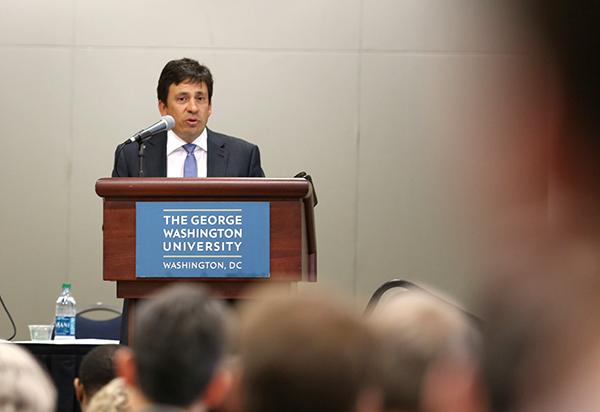The University’s 10 schools could be required to set policies on similar topics, like how to evaluate a dean’s performance and tenure review, by the end of this year, marking the first time every school’s bylaws will address certain issues.
Four working groups made up of professors, administrators and trustees will spend this year deciding how schools will have to rework their bylaws as part of a review of the faculty code led by Board of Trustees chair Nelson Carbonell to update and streamline processes across campus.
The faculty code, which sets up how the faculty, administrators and Board govern the University, also lays out what schools must address in their own bylaws.
Carbonell said schools currently have too many differences in their individual bylaws, pointing to the School of Engineering and Applied Science’s three-page set of rules, compared to a 40-page booklet for the GW Law School.
“It’s about having a framework so that the schools don’t necessarily have a completely consistent set of rules, because the schools are different, but they have consistent sets of what they have rules about,” Carbonell said in an interview.
Madeleine Jacobs, the trustee who is overseeing the working groups, will likely present to the Faculty Senate next month for the first of what will be several updates on the project’s progress. The recommendations could come to the Faculty Senate for approval before reaching the Board of Trustees by the end of the academic year.
Each working group has met three times to start planning how the code, which lays out how faculty share power with administrators, will look at topics like how dean searches are carried out and how more faculty can be involved in policy-making at the University.
The Faculty Senate has hesitated to throw its support behind Carbonell since last fall when he announced that the Board planned to rewrite the faculty code in a year. With a slower approach, most faculty have gotten on board.
Carbonell discussed the project at several senate meetings last year, and had met with more than 800 faculty members. That’s when Carbonell originally floated the idea of a University-wide tenure committee, which one of the working groups will consider this year.
Each working group will address the other four areas – participation in governance, promotion and tenure, search and review processes for deans and other academic administrators and rules and procedures.
Last spring, faculty members who wanted more say in the code revision process formed the Faculty Association. Andrew Zimmerman, the rival faculty group’s president, said the association wanted to highlight issues that all full-time professors face, regardless of whether they are on track for tenure. All members of the Faculty Senate must be tenured professors.
“We’re trying to figure out various problems faced by different faculty,” he said. “For example, we all face issues about health insurance.”
Charles Garris, the chair of the Faculty Senate executive committee, said he was confident the revisions to the faculty code would strengthen the shared governance policies.
Garris, who was one of Carbonell’s harshest critics when he announced plans to rewrite the code last fall, met regularly with Carbonell last year as chair of the Professional Ethics and Academic Freedom committee.
“On a wide range of issues, faculty have had a large impact on directions and policies of the University, and shared governance is not limited to the activities of the Faculty Senate,” Garris said.







